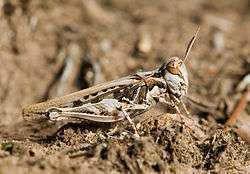Austroicetes frater
| Austroicetes frater | |
|---|---|
 | |
| Scientific classification | |
| Kingdom: | Animalia |
| Phylum: | Arthropoda[1] |
| Class: | Insecta |
| Order: | Orthoptera |
| Suborder: | Caelifera |
| Superfamily: | Acridoidea |
| Family: | Acrididae |
| Subfamily: | Oedipodinae[2] |
| Genus: | Austroicetes |
| Species: | A. frater |
| Binomial name | |
| Austroicetes frater Brančik, 1898 [3] | |
| Synonyms[4] | |
The southern austroicetes[5] (Austroicetes frater) is an Australian grasshopper in the genus Austroicetes.[6]
It is found in regions of Western Australia, South Australia, Victoria, Tasmania, Yorktown[7] and New South Wales.[8] Information regarding the species has been published in Jahresheft des Naturwissenschaftlichen Vereines des Trencsiner Comitates (Jahresh. Naturwiss. Ver. Trencsiner Comit. ) 19-20 by Karel Brancsik in 1897. There are no subspecies listed in the Catalogue of Life.
Description
The southern austroicetes has a slim, tan body and burnt umber eyes. It has wings, but mainly jumps with its back legs. A shield, called pronotum, is located at the front segment of the thorax. The last section of the leg has four segments and the antennae has more than seven segments. The joint between leg and foot (tarsi) has 11 segments, with spiracles on the first eight. A. frater is abundant from mid August to early December. Their diet consists of a diversity of food, although they prefer green plants. There has been continuous usage of ULV insecticides and bran baits on the grasshopper.[9]
Life cycle
Adults lay eggs in the ground around June or July. The eggs begin to mature, then go to sleep until they are awoken by the cool weather of winter. The eggs rapidly mature as temperature increases in spring, and hatch the following August when abundant food is available. Nymphs shed many times, and become adults who lay eggs between October and November. One generation is produced annually.[9]
Etymology
The prefix austro- in Austroicetes is used in compound words, meaning "south". It was derived from the Latin word "austr".[10] The word "frater", derived from Middle English "freitour" and Old French "fraitur", means "brother" or "members of the same nation".[11]
See also
- Austroicetes vulgaris
- Family Romaleidae
References
- ↑ "Animal Diversity Web: Austroicetes frater". 2014 Regents of the University of Michigan. Retrieved 30 November 2014.
- ↑ "zipcodezoo.com: Austroicetes frater". 2004-2013 David Stang. 8 May 2014. Archived from the original on 4 December 2014. Retrieved 30 November 2014.
- ↑ "Austroicetes frater (Brancsik, 1898)". Department of the Environment, Water, Heritage and the Arts. 9 Oct 2008. Retrieved 2009-05-06.
- ↑ "GBIF: Austroicetes frater (Brancsik, 1897)". 2014 GBIF. Retrieved 30 November 2014.
- ↑ "Orthoptera Species File (Version 5.0): species Austroicetes frater (Brancsik, 1897)". Retrieved 30 November 2014.
- ↑ "Encyclopedia of Life: Southern Austroicetes". Retrieved 30 November 2014.
- ↑ "Database of Grasshoppers and Their Allies of the World". Retrieved 30 November 2014.
- ↑ "Austroicetes frater (Brancsik)". CSIRO. 19 September 2004. Retrieved 2009-05-06.
- 1 2 "Small Plague Grasshopper: Austroicetes cruciata, Austroicetes frater and others". herbiguide. Retrieved 30 November 2014.
- ↑ "Dictionary.com: Austro-". 2014 Dictionary.com, LLC. Retrieved 1 December 2014.
- ↑ "Dictionary.com: Frater". 2014 Dictionary.com, LLC. Retrieved 1 December 2014.
External links
![]() Media related to Austroicetes frater at Wikimedia Commons
Media related to Austroicetes frater at Wikimedia Commons